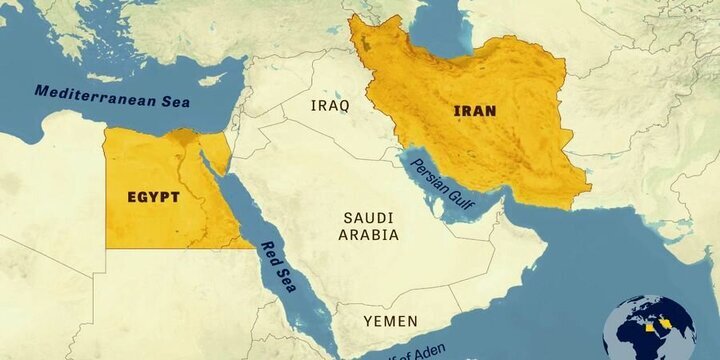Cairo and Tehran: Redrawing the lines of regional engagement

Cairo – The visit of Iranian Foreign Minister Abbas Araghchi to Cairo marks a highly significant diplomatic moment in a turbulent regional context. It reflects a gradual shift in Egyptian-Iranian relations, which had been frozen for decades due to geopolitical considerations and divergent regional alliances.
The reception of Araghchi by Egyptian President Abdel Fattah El-Sisi sends a dual message: one to Iran, signaling the possibility of broader official communication channels, and another to international capitals, emphasizing that Cairo is acting in line with its national interests and strategic balances. This reinforces Egypt's position as a flexible actor in shaping West Asia’s dynamics.
The political dimension of the visit goes beyond the resumption of bilateral relations, extending to Egypt’s attempt to reclaim its role as an active diplomatic mediator in sensitive issues, particularly the Iranian nuclear file. Cairo’s hosting of a trilateral meeting involving Araghchi, IAEA Director General Rafael Grossi, and Egyptian Foreign Minister Badr Abdelatty carries strategic implications for Egypt’s repositioning at the heart of nuclear non-proliferation equations. This grants Egypt new leverage in regional security arrangements and aligns with its historical stance advocating for a West Asia free of weapons of mass destruction.
The nuclear aspect of the visit serves as a real test of Egypt’s ability to play the role of a "constructive neutral zone." While not a party to the Muscat negotiations, Egypt possesses diplomatic capital that could be invested in facilitating understandings. This role aligns with Cairo’s principled and steadfast commitment to limiting nuclear proliferation as a cornerstone of its vision for collective security in West Asia. It also helps Egypt formulate balanced and internationally acceptable positions among various regional and global actors.
Furthermore, the separate meeting between Araghchi and Egyptian political and economic elites holds both symbolic and strategic significance, reflecting Iran’s desire to develop a "second track" in relations—one that bypasses governments and relies instead on elite understandings, think tanks, and investment firms. This approach could establish common ground for shared priorities and overcome the stereotypes that have long hindered bilateral relations.
These meetings also present an opportunity for Egypt to present its vision for regional cooperation from an integrated perspective encompassing economy, security, and culture. To achieve this, Cairo is expected to propose non-confrontational approaches to thorny issues like Yemen and Syria, emphasizing that economic cooperation cannot be separated from security and political realities. In this sense, Egypt is practicing a form of "preventive diplomacy" aimed at reducing regional tensions rather than merely managing them.
The timing of the visit is inseparable from broader regional contexts, particularly the relative U.S. withdrawal from West Asian affairs and the growing competition among Turkey, Iran, and Israel in contested areas like the Caucasus and the Eastern Mediterranean. Within these dynamics, Cairo sees an opportunity to present a third model for regional relations—one based on containment rather than confrontation, and dialogue rather than polarization—while maintaining its Persian Gulf and international alliances.
On the economic front, Egypt could offer Iran promising opportunities for cooperation, especially in energy, maritime transport, agricultural investments, and petrochemical industries, leveraging its geographic position as a gateway to African markets. In return, Tehran could propose preferential agreements for Cairo in non-sanctioned sectors, opening the door for "calculated" cooperation that considers international reservations without missing developmental opportunities.
At the IAEA level, the participation of its director general in the trilateral talks adds a technical dimension that enhances the visit’s credibility. Through this meeting, Cairo could propose a regional project to support nuclear transparency—not only in Iran but also in Israel and elsewhere—within the framework of Egypt’s long-standing vision for a WMD-free Middle East. Though ambitious, this proposal grants Egypt a moral and diplomatic standing that cannot be ignored.
Given the challenges surrounding Iran’s nuclear program and the growing need for mutual regional guarantees, Egypt could position itself as a reliable partner in any potential regional consortium for nuclear fuel enrichment or oversight of peaceful nuclear uses, in cooperation with the IAEA. Cairo’s technical nuclear expertise and longstanding membership in the Non-Proliferation Treaty (NPT) lend it credibility to play a supervisory or coordinating role in certain stages of peaceful nuclear energy use in the region, whether through joint verification mechanisms or by hosting training programs and regional technology centers to enhance transparency and build trust. Egypt’s involvement in this new framework could help reduce mutual suspicions and provide an Arab alternative that reassures regional capitals regarding Iran’s nuclear objectives without resorting to escalation or military options.
These dynamics also reflect Iran’s eagerness to increase engagement via indirect channels, seeking to overcome diplomatic blockades via Arab actors with regional and international legitimacy, such as Egypt. Thus, Tehran is using this visit to test the limits of rapprochement and explore the possibility of reshaping its relations with major Arab players in a potential post-nuclear deal phase—or even in the absence of such a deal.
In conclusion, Abbas Araghchi’s visit to Cairo emerges as a diplomatic turning point in Egypt’s policy of "pragmatic openness," without compromising its core principles or strategic alliances. Egypt’s foreign policy is not shifting its axes but rather expanding its maneuvering space and creating avenues for dialogue, reinforcing its status in the regional and international order as a balancing actor capable of building bridges between adversaries and offering practical solutions in moments of complexity.
Leave a Comment